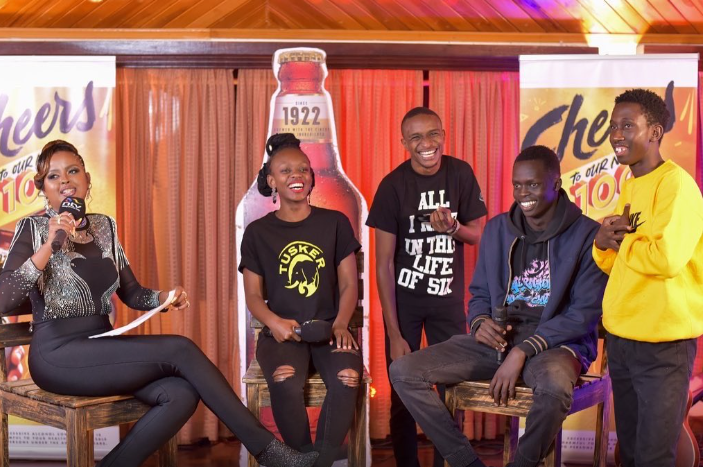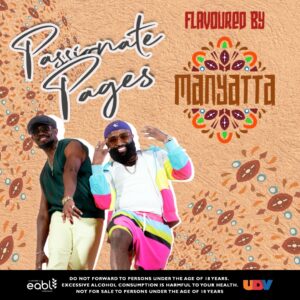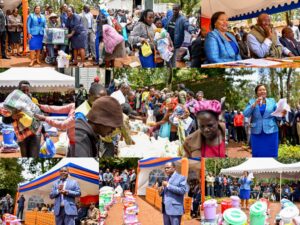An Inside Look at Tusker Nexters Finalists

Kangemi Born Malvine Muhonja Mbone, a.k.a Lancy
Malvine Muhonja Mmbone, known as Lancy when she rocks the stages, is a vocalist originally hailing from Kangemi, Nairobi.
Her stage name, Lancy, is inspired by the people she in her life that she loves and that care about what she is doing, which is her music. The two are her mum and brother.
Being from Kangemi, Malvine found it challenging to get opportunities to showcase her talent in music, especially since she was doing r&b, which is a genre of music that was considered different in her environment.
The Kangemi native has been practising music she was in primary school. When she got to high school, she counts herself fortunate to have gotten a music teacher that was kind enough to take her under her wing and offered her invaluable insights on what she could do to improve on her vocals. In addition, she offered the young Mmbone training on how to control her voice while singing.
This teacher was also instrumental in helping her overcome the stage fright that Mmbone, a girl with a naturally reserved personality, struggled with at the time.
After high school, she made the decision to take her music even more seriously, and now, Mmbone is finally beginning to see her hard work pay off.
Mmbone’s preferred genre is rhythm and blues, a style of music that has proven time and again to be one of the most commercially successful genres in the modern music industry.
Known as r&b, this genre is characterised by emphasizing melismatic, soulful singing and catchy melodies. She cites Nikita Kering, Nyashinski and Fari Athman as some of the acts whose music inspire her.
According to Mmbone, she makes the decision to keep making music every day because of music’s unique power to relate with everybody.
“It is one of the few things that, like nothing else, has the ability to get people through the hard times and to allow people to celebrate during the good times,” she says.
The person and artist that Mmbone is today, she attributes to her family and the circumstances in which she was raised. “I have always depended on my mother. She is my rock, playing the role of both mother and father for myself and my brother. Since I was a little girl, I have seen her work tirelessly, early mornings and late nights, just so she could ensure we lacked for nothing. She is a fan of my music as well, listening keenly when I sing and offering suggestions and corrections where she thinks I need it. To say that I am grateful for her would be an understatement.”
Tusker Nexters has been huge for me since I took part. I was on my way home one evening when two ladies approached me, and told me about it: the venue, dates and what they were looking for. As someone with dreams of getting into and making it in the music industry, I figured it was a chance that I could not pass up.
Since making it as a Nexter finalist, Mmbone has noticed a slight increase in popularity, especially in the areas around Meru Town. Being a student in one of the campuses around there, she spends quite a bit of time there throughout the year. When asked how her career trajectory would pan out, if it was up to her, she pauses thoughtfully, then says: “I would prefer it to be nice and simple. A learning experience with gradual gains, where with each step I get to learn. I would not want to get that overwhelming sense of fame.”
So far, some of the other Nexters that Mmbone admires are Emma, who is one of her fellow finalists from the Mountain region. “She is cool,” she says. The other Nexter she mentions is Zaituni, who was a finalist from Nairobi. “Her vocals are great,” she says.
From the conversation had with Mmbone, she has her sights set high: in the next few years, she plans to be able to write her own music, and possibly getting a record deal at a top-tier label. This dovetails well with her greater plan, which is to also lend a hand to other talented artists who were not lucky enough to get an opportunity at the Tusker Nexters talent search.
Rift Region
Jonathan Owilla a.k.a Jaju
As a little boy growing up in the Kariobangi South area of Nairobi, Jonathan Jaju Owilla’s catchy, innocent song that he came up with for his class talent showcase captures the imagination of the school and lands the Standard One boy the award of most talented lower primary talent search, and bags of notoriety. Who would have thought that a 6-year-old could capture the imagination of the whole school? Maybe this something he can cultivate.
Now one of the finalists of the Tusker Nexters talent search, Jaju is well on his way to realising his dream of being one of the best musicians in Kenya, with co-signs from artists like Fena Gitu, Jua Cali and Mejja, as well as Tusker Project Fame legend, Ian Mbugua.
The artist formerly known as Jaju the Man cuts a tall imposing figure, thanks to his 6’2” frame. He is candid about his past, chuckling as he recollects a time when he was a chubbier fellow, chasing his music dreams. His extra padding did little to dissuade the ladies, who affectionately referred to him as Jaju the Man, a moniker that quickly stuck because, well, Jaju does it for the ladies. He, however, ended up dropping the ‘The Man’ part, on grounds that it comes off as a little too big-headed for his liking.
He reveals the origins of his name, which come from his dad, who was employed by Indian coolies in the pre-independence times. The coolies that Jaju Senior worked under slapped him with the name. He then assimilated it into his name, and it became his surname, which was eventually passed down to Jonathan.
Jaju hails from Nairobi, originally. He is a fresh campus graduate, explaining that he went to campus in Nakuru but moved away from Kenya’s newest city to give himself a better chance at succeeding in music. He is now based in Nairobi, a move that he says was necessary because of the opportunities to be had in the nation’s capital.
He started taking his music seriously five years ago and has been doing so ever since. He realised he had a natural knack when he took part in a talent showcase in Standard 1. His song, which was basically a catchy diss track to another school, went viral and won the class, and eventually the lower primary talent search, and notoriety by the bag.
He describes his musical style as versatile, adding that he does not pigeonhole himself when it comes to expression through music. However, he admits that when it comes to writing music, he tends to lean towards AfroPop and Zouk genres.
At this point, Jonathan segues into his musical influences. He credits Sol Generation and
Burna Boy as his main influences, especially when he is writing. He is, however, still working on finding his own signature style to differentiate himself from the artists that inspire him.
Jaju came to know about Tusker Nexters when he was out with his friends at his local on a Friday night. He mentions how he usually carries his guitar and strums away to set the vibe as his friends relax and unwind over a few drinks. Some nights, as he does this, he picks up a few tips. He had originally planned to attend the Nairobi edition of the Tusker Nexters talent search, but on that Saturday, Jaju, a Seventh Day Adventist, had made prior plans to attend church. This is how he ended up missing it. The next weekend, as he was on his girlfriend’s phone, idly scrolling through her WhatsApp status feed. He saw a post that piqued his interest. Jaju’s younger brother, who is a musician as well, had posted the Tusker Nexters poster and invited anyone who cared to come and bear witness to the start of his journey to stardom. He decided then and there that he would go and audition. One catch. He was broke. His girlfriend gave him three thousand and made him promise he would win.
Since the Nexters show, he has not become any more famous per se, but people around him recognise that his star is finally beginning to shine, and he is seeing to see the fruits of all the hard work he has been putting in. He wishes that his mum and dad were alive to see him make forward strides in the craft that he loves.
Jaju’s mum was in the church choir, and she was a big influence in making Jaju and her older sister get into music. Although he lost his mum and dad in 2018 and 2020, Jaju’s family has always been supportive. Even his girlfriend, to whom he fondly refers to as “Potential Mrs.” is a big supporter of Jaju’s musical dream.
Jaju stays extremely optimistic for the future. He envisions himself winning the national finals of the Tusker Nexters, set up good relationships with and get in the studio with some of the more established stars in Kenyan music. Jaju is so intent on his dream, that he already has songs penned for the likes of Nyashinski, Chris Kaiga and Khaligraph Jones. From there, he begins to rack up the awards: AFRIMMA, then Grammy Awards. The sky is the limit for Jaju the Man, through hard work and determination.
He expects a high level of competition at the finals, because he believes that no artist could have gone ahead to the finals without being extremely talented.
For the future, Jaju has his eyes set on the Pulse Best New Artist award. To do this, he is focused on building his fanbase and then dropping new projects to propel him towards these awards. He is also focused on building his personal brand and making himself into a force to reckon with in the Kenyan and African music industry.
Nairobi
Heavyweight
Harrison Ouma is a seasoned battle-rapper from the Dandora neighbourhood of Nairobi. His Heavyweight handle came about as a result of people in his ‘hood recognising him from his exploits during rap battles and his freestyles and referring to him as ‘Mzito.’ He decided to adopt the name, translating it to English and styling himself as ‘Heavyweight’ from then on.
Dandora is the spiritual home of hip-hop in Nairobi, with some big names in Kenyan hip-hop like Wenyeji, Ukoo Flani Mau Mau and Kalamashaka coming from this neighbourhood. In terms of resources, Ouma believes that being a Dandora native may have been a hindrance for a few things, ranging from the reputation of his neighbourhood. Scarcity of resources, such as limited finances and access to facilities like studios, which has in turn limited how much music he can make and put out.
Ouma has been doing music still 2013, when he began a street artist. The decision to commit to the craft seriously was made in 2014. Growing up, he was an active member in the community, interacting with other children in the neighbourhood, keeping busy in order to avoid any influence from anything that could be detrimental to his development, or worse, land him in trouble. He was an active member of the journalism club when he was in primary school, through to high school. The effect that this has had on him comes across as well, as Heavyweight’s diction is concise and articulate, both in his raps and his speech. He describes himself as a hip-hop head, and a poet. In the future, however, he pegs himself as a versatile artist, and a musician that is not confined to one genre. However, there is no denying the influence that his surroundings have had on him. Dandora is fondly known as Hip-hop City, and in his formative years, it was always around him. His older brothers were always bumping the sound and rapping as well. He watched Kalamashaka, Zakah and the Vigeti brothers rock the mic on many occasions, and this imprinted on him.
Interestingly, Ouma cites not the artists he watched perform and grew up around, but an uncle of his as one of his biggest influences on himself as an artist. His uncle was a band member in one of the renowned Benga bands of his time, called D.O. Misiani. His two older brothers are also a big influence, one of them goes by the name Javan the Poet and is a Kenyan rhymester of some repute. The other is also a freestyle rapper whose influence on Heavyweight is clear. Other than these two, Ouma also cites Jua Cali and Nyashinki as artists he looks up to. He also takes inspiration from nature, the sights and sounds that he hears and sees, and the socio-political environment that he finds himself in.
When asked about the role that his family played in making him who he is today, Ouma waxes lyrical about his mother and brothers: “My mother is a big inspiration to me, as well as my brothers, from my pen game, to how I present myself to the workings of the music game, I am forever grateful to my parents for making me into the person and the artist that I am today.”
Ouma first heard of the Tusker Nexters talent search on social media and since getting involved and appearing as one of the finalists, he has seen some change, from strangers shouting his name in the streets and a boost to his street credibility. He sees the platform that Tusker has provided as a boost to his career trajectory and expects his brand to grow thanks to the experience. He speaks highly of his fellow Nexters finalists as well, referring to them as extremely talented. He expects them to go far in their musical journeys as well.
Ouma is optimistic for the future. He looks at the path ahead of him as one of learning, where he will build relationships and networks that will grow him as an artist as well as on a personal level. He reserved shout outs for Ian Mbugua and Ndovu Kuu for the insights they shared with him. “Heavyweight for the future,” he adds, with a confident laugh. “Watch this space.”
Coast
Lexxie
Alexandra Wanja Waweru is a up and coming artist, born and bred in Mombasa, Kenya. Her stage name, Lexxie, came about in a way not too far removed to the way most nicknames come about. It was slapped on her by her close friends, who felt like Alexandra was far too formal for them.
Music, says Lexxie, is part of her DNA, and has been passed down from her grandfathers, who sang Bango music, which is a style of easy-listening music that fuses traditional Portuguese music genres, Arabic influenced taarab music, jazz and music genres of local coastal Bantu languages. When she was in school, Lexxie took piano classes, sang in the choir and was a mainstay in music festivals. By the time she was done with high school, Lexxie had no doubt about what she wanted to do with herself. It was always going to be music.
She is a self-proclaimed r&b and pop singer, although she mentions that the kind of music, she would write depends on the kind of mood she finds herself in, or the vibe that she gets off an instrumental, for instance. The genre she prefers and feels most relaxed around, however, is r&b.
Lexxie draws inspiration from her faith and her family. She does not think she would be where she is today without the two: God and family. Her family is extremely supportive and continue to play an integral role in her music career. As a mother, every morning when she wakes up, she is motivated to be the best version of herself for her young son. Artistically speaking, she draws inspiration from Rihanna, H.E.R. and Bensoul. She admires Rihanna and H.E.R.’s sentimental style of music, and for Bensoul, Lexxie is inspired by the Sol Generation crooner’s song writing technique.
Lexxie first heard about Tusker Nexters from social media. Instagram, to be specific. For one reason or another, though, she struggled to wrap her head around the concept of it. When her sister told her that she would be auditioning, she explained it to her and that was when she got a better grasp of it and decided that she would also take part. She, of course, ended up winning and emerging as one of the Coast region finalists.
Since taking part in Tusker Nexters, and experiencing all that has come with it, Lexxie feels that she has made big strides personally, as well as an artist. From the mentorship she has received from Tusker Project Fame and overall Kenyan performing arts legend Ian Mbugua to getting the chance to share the Tusker NexterFest stage with Nviiri the Storyteller, Lexxie is grateful for the opportunities and wider fanbase that she has been able to access since becoming one of the Coast Region Tusker Nexters talent search finalists.
For the future, if she could get to speak it into existence, Lexxie would like more access to many different producers in order to develop a diverse portfolio of sounds, genres and musical styles.
I think the other Coast finalists are extremely talented and good at what they do, and it is no surprise that they made it as finalists in the talent search. I am honoured to be going through this experience alongside them.
In the future, I hope for success as a musician and as a person, and to somehow involve the people who have helped me in one way or another during this journey.
Lake
Kamwana
Alex Bob Ogola Kamwana is an artist looking to deliver on a promise he made to his late mother. He promised her that one day, he would make a name for himself as one of Kenya’s biggest musicians.
Ogola represents Kisumu, where he was born and raised. He describes Kisumu as a place that only celebrates big names: “Doctors, lawyers and pilots are what Kisumu celebrates. Musicians are treated differently, which has had a negative effect on what talents come out of the city, and the musical growth of Kisumu-based musicians,” he says.
Ogola discovered his talent for music back when he was in high school. He began taking his music seriously after clearing high school and has been on that path ever since. His preferred genre is folk fusion, but since that is yet to catch on, he finds himself straying from the path and doing other genres like pop and dancehall to give audiences what they want, as he builds a name for himself.
Growing up, Ogola was always listening to old Rhumba and Benga music, so naturally, his inspiration comes from artists and bands from this genre, such as Ayub Ogada, Les Wanyika and Tony Nyadundo.
Ogola’s parents passed away before he was able to share the product of his talents with them. His surviving kin, however, are extremely supportive and love the music that he makes. His cousins and aunt are always pushing him to go for his goals.
Aside from music, Ogola’s day-to-day hustle is delivery services. He came to know about the Tusker Nexters talent search while he was out and about, working. After seeing the Tusker Nexters billboard at the Kondele roundabout in Kisumu, he was interested. A quick search online revealed what he needed to do to get himself an audition slot in the Lake Region auditions. The rest, as they say, is history.
Since taking part and making it as one of the finalists for the Tusker Nexters Lake Region talent search, Ogola has seen his stock go up. He has made valuable connections, met new people and artists from Kisumu. He rates his fellow Lake Region Nexters finalists very highly and backs the region to bring the heat to the Tusker Nexters national finals.
The Kisumu native’s outlook on his career is optimistic. He envisions his music to be a unifying tool, to bring people together. He is looking to one day go on a world tour and spread his music to the world, as a standard bearer for Kenyan music.








